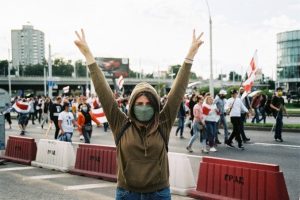By Kevin Hughes
The United Nations Human Rights Committee (“the Committee”) is a body of independent experts responsible for interpreting and applying the International Covenant on Civil and Political Rights (ICCPR or “the Covenant”). The ICCPR came into effect in 1976, establishing the Committee to implement the ICCPR. At present, 173 countries have signed onto the ICCPR. In addition, 117 of those countries have also acceded to the ICCPR’s First Optional Protocol (“the Protocol”), which allows individuals to submit complaints, called “individual communications,” to the Committee for violations of their ICCPR rights under the Covenant.
As of February 8th, 2023, that number became 116, with Belarus submitting its withdrawal from the protocol in late 2022. Article 12 of the ICCPR allows countries to withdraw three months after the State party notifies the Secretary General of its intention to do so.. Belarus ratified the Protocol in 1992, and is one of only 4 States to have withdrawn from the Protocol, joining Jamaica, Trinidad and Tobago, and Guyana. It is the first in over 20 years to do so, and its withdrawal closes the path for Belarusian citizens to appeal cases to the Human Rights Committee.


[Protests against president Alexander Lukashenko, following elections in 2020, which were widely deemed by election observers to be illegitimate.]
Photos by Jana Shnipelson on Unsplash
When an individual submits a complaint under the Protocol, the government of the country in question is given the opportunity to respond to the allegations if the Committee determines the complaint is admissible. After reviewing the case, the Committee publishes its “Views”, on many occasions finding a violation of the ICCPR and requesting the State address the violation and provide a specific remedy. These remedies may include the payment of financial reparations to individuals, the release of prisoners, or some other type of State action or policy change.
The Committee’s General Comment 33 — “The Obligations of States Parties under the Optional Protocol to the International Covenant on Civil and Political Rights” — provides guidance on the implementation of the Protocol, including the process of making a complaint, States’ duties to respond, and the Committee’s process for adopting Views. The General Comment also clarifies the “quasi-judicial” nature of the Committee and its Views (paragraph 11). While the Committee’s decisions are by and large viewed by countries as non-binding, the Views are still often taken into account by domestic courts, albeit in a selective manner.
Numerous complaints against Belarus have been filed with the Committee since 1992. As of mid 2020, the Committee had released Views on over 150 cases against Belarus, and at the most recent meeting, the 136th session, almost a quarter of the Individual Communications reviewed by the Committee were against Belarus, with human rights violations found in every case. These cases reflect the government’s ongoing human rights violations, many committed during crackdowns on protests and other activism.
Outside of the Committee’s decisions, the continued human rights abuses by the Belarusian government have been well documented. Political opposition to the ruling party and President Aleksandr Lukashenko, is effectively banned by the government, and opposition leaders are punitively and arbitrarily imprisoned. Over the past few years violations have increased, with public unrest and protest in the 2020s leading to aggressive crackdowns that were condemned by the UN High Commissioner for Human Rights. The repeated violations have led to an increased need for international remedies as domestic courts in Belarus are unwilling or unable to address the violations. As the UN Human Rights Council notes, this impunity for rights violations occurs in many cases due to issues including presidential influence over the judiciary and the prevalence of restrictive procedures such as closed hearings. In spite of the need for guidance and oversight of the judiciary, the country is withdrawing from the international community and disallowing the Committee from hearing cases related to its violations to reduce the scrutiny of its human rights abuses and remove potential avenues for international recourse. The Committee vigorously denounced Belarus’ decision to withdraw, and the only UN treaty Belarus now permits its citizens to pursue individually is the Convention on the Elimination of All Forms of Discrimination against Women. The country is also not party to any other international human rights bodies, including the European Court of Human Rights or the Rome Statute of the International Criminal Court.
While this action by Belarus is simply a case of one country withdrawing from participation in a single UN treaty body mechanism, it should be considered in the context of several recent moves towards protectionism, devaluing of human rights, and rejection of international bodies that enforce human rights. In October 2022, the Committee reviewed the human rights records of both Russia and Nicaragua in absentia, a historic first as neither country had sent delegates to the mandatory review. Even more recently, the Burundi delegation walked out at the start of its country review in July 2023, protesting the attendance of accredited human rights activists and making clear their unwillingness to cooperate with international mechanisms. Looking to other international human rights bodies, Philippines withdrew from the Rome Statue in 2019, as did Burundi in 2017, Nicaragua announced its intention to withdraw from the Organization of American States in 2022, and Russia withdrew from the European Court of Human Rights in 2022. All these examples, along with the Belarusian case, signal a troubling shift from acknowledging the legitimacy of international human rights enforcement bodies (even while potentially violating the rights protected), to an outright rejection of the enforcement bodies altogether. While the efficacy of the international human rights enforcement bodies has been uneven, they have at least offered publicity and awareness of grave human rights abuses and engaged governments in discussions of rights protections. The trend of shutting down appeals to the UN human rights bodies is a troubling step in the wrong direction.
Kevin Hughes is a second-year law student at the Peter A. Allard School of Law. He is a member of the IJHR Clinic’s Human Rights Committee Team.